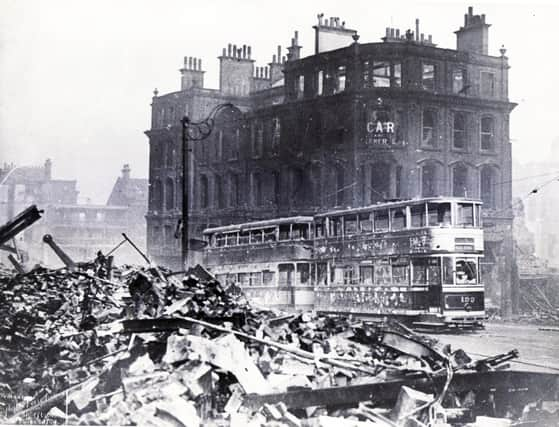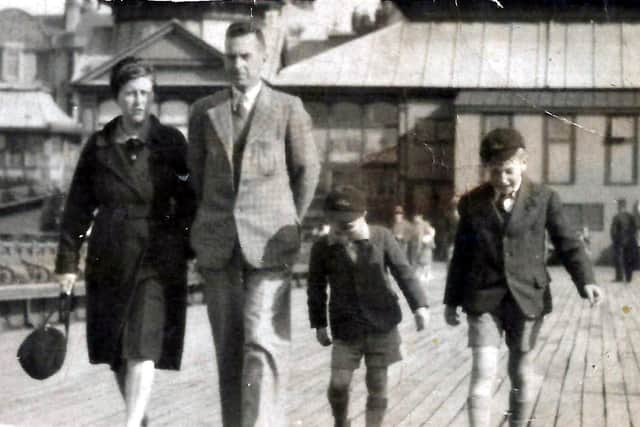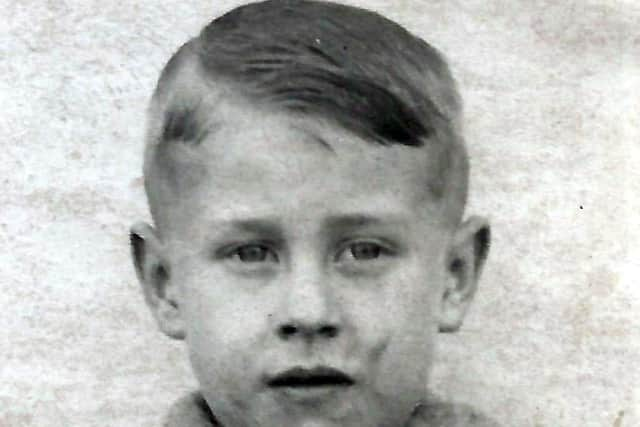"Children didn't understand the gravity of war" says Sheffield Blitz survivor


As I got older and started school things are very much clearer.
At home, Dad had been given an Anderson Shelter by the Government, and he had dug out a large hole at the top of the garden (next to the outdoor toilet), and erected the shelter in the hole, then covering it with the earth he’d dug out.
Advertisement
Hide AdAdvertisement
Hide AdThis would serve as our protection against bombs for the rest of the war. I remember that it was very smelly, damp and that there were two bunk beds in it, and we had candles for lighting.


We had to go down two or three steps to enter. It was brought into use whenever the sirens sounded, warning the whole of Sheffield of the possibility of an air raid.
Mum would come into our bedroom (I had an older brother), wake us up and say “Come on boys, it’s that man again!”
She meant Hitler, of course.
We’d then wrap blankets around us and go up to garden to get into the shelter.


Advertisement
Hide AdAdvertisement
Hide AdAs young boys we thought it very exciting, but my Dad, who was very impatient, used to sit there for about half an hour, and if the “All Clear” didn’t sound, he’d say “That’s it, I’m off to get a cup of tea”.
He’d go back into the house (which Mum felt very uncomfortable about) and come back after a few minutes with steaming drinks for all of us.
Sometimes, the family next door would join us in our shelter, because they didn’t have one.
Their Dad was away in the Army, and no-one had been able to build their shelter, so they shared ours. It made it a little crowded, but warmer when we all snuggled together.
Advertisement
Hide AdAdvertisement
Hide AdI remember that our back door, which led directly on to the backyard, had a special switch on it which would automatically put the light out when the door was opened. All the windows of the house had “blackout” curtains so that light could not penetrate outdoors and give the Germans a
clue as to where we were.
The whole of Sheffield was blacked-out, with no street lights and the few cars that there were around in those days had heavily shielded headlights.
Air raid Wardens used to go round the street, checking that no light issued from the houses.
We often heard the familiar cry in the distance “Put that bloody light out!”
Advertisement
Hide AdAdvertisement
Hide AdAir raid Wardens were recruited for each street, and ladders and stirrup pumps were placed in strategic places to be used in need of fire and/or destruction.
Any house which looked after a ladder had a red “L” sign nailed to the front of the house.
An “S” stood for stirrup pump.
Going to school after an Air Raid was very exciting.
By the time I got to about six years old it was deemed that I could get there myself (instead of being taken by Mum).
I’d set off with my gas mask box on my shoulder (everyone had to carry a gas mask with them), and although it was only about ten minutes’ walk to school, it sometimes took a little longer, because all the schoolboys went out looking for bits of shrapnel (ironwork discharged when a bomb exploded) to keep as a prized possession, or possibly to swap for marbles!
Advertisement
Hide AdAdvertisement
Hide AdAt the top of our street was a derelict bit of land where a bomb had blown the buildings down, and the crater had filled with water, which was very sensibly
left as an emergency supply for the Fire Brigade should it be needed. We weren’t supposed to go on “the bombed buildings” as it was know, but that only made it more exciting to go and explore!
Talking about bombed buildings reminds me that my Aunty Ruth, along with cousin Ann, had had to move out of their house because it had become unsafe due to bomb damage.
They went to live with my other Aunty in the countryside.
At school, things were pretty much as they might be today, except that Air Raid shelters had been built in the school yard, and we were often called out for Air Raid Practice, and sometimes even had to take shelter when the sirens sounded warning of a forthcoming air raid.
Advertisement
Hide AdAdvertisement
Hide AdThey didn’t happen very often because most of the raids occurred at night-time.
When we went into the shelters either as a practice or for real, we always sang songs together – “One man went to mow” was very popular.
Everyone wanted to know how the war was progressing, and almost every family had a radio. We would sit at home, grouped around the wireless set (as it was known then), and listen very intently to the announcer recount the official bulletins issued by the War Office.
At times it was depressing news – at others very re-assuring.
Advertisement
Hide AdAdvertisement
Hide AdIt was such a family ritual to listen to the news regularly each day, that when the war eventually ended, I remember asking Mum whether there would be a news programme ever again!
Food and clothing supplies were very short, and everyone had a ration book, which contained vouchers which had to be presented when making a purchase of anything that was “on ration”.
My only concern was whether I had enough vouchers to buy my regular 2 ounces of sweets on Saturday, when I received my pocket money.
However, Mum had the job of making sure that we all had the essentials, and she monitored the ration books with great care. If I needed say, a new pair of shoes, she didn’t only have to find the money, but she had to make sure that we had enough ration vouchers to acquire them.
Advertisement
Hide AdAdvertisement
Hide AdSometimes, we hadn’t, and I’d have to make my worn-out shoes last for perhaps another three months until we’d saved up enough vouchers for new ones. I didn’t mind, but Mum wasn’t happy to see me in shoes with holes in the soles.
When the Government decided that it needed more steel and iron to make aeroplanes, tanks, and other fighting equipment, they made a plea for anyone with redundant or worn out pots and pans or other metal items to turn them in at selected reception centres.
In addition, men came round all the streets taking away the railings which were outside most properties.
In many cases you can still see the stumps of the railings in the tops of walls, where the railings were never replaced.
Advertisement
Hide AdAdvertisement
Hide AdMy Dad was a bus driver (a “reserved occupation”), so he was never called up into the forces, but he still had a few dangerous moments. He was regularly on the Sheffield to Barnsley route, and on the nights of the Sheffield blitz he was returning from Barnsley via the Wicker, but he had to abandon
the bus there as there were many damaged trams and other vehicles blocking the road as a result of the bombing.
He simply left the bus where it was and walked home to our house in Crookes whilst the bombs continued to fall.
Mum cried when he eventually arrived home.
When the war eventually ended, my teacher at school brought a banana and a pineapple to show us, as none of us had ever seen one before.
Advertisement
Hide AdAdvertisement
Hide AdIn retrospect, we children were not frightened by the war, we just didn’t understand the gravity of the situation, and after all, it was all that we had known.
It’s different thinking about it now, but we really did enjoy a very happy childhood.